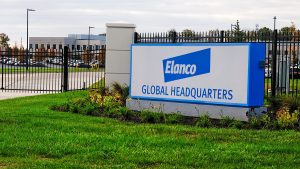
Sweeping review looks at effect of weight-loss drugs on 175 conditions
The research is the first to attempt to comprehensively investigate the impact—both good and bad—of the GLP-1 weight-loss drugs on the human body.

The research is the first to attempt to comprehensively investigate the impact—both good and bad—of the GLP-1 weight-loss drugs on the human body.

The lawsuit alleges the price increases EpiPen, used to treat severe allergic reactions, prevented other similar medications to from going to market.

The company expects fourth-quarter revenue to be about $13.5 billion.

The Indianapolis-based drugmaker will acquire Scorpion’s STX-478, a once-daily oral treatment in early trials for breast cancer and other advanced solid tumors.

Pills would be more convenient for patients and also easier to manufacture at large scale than other top weight-loss drugs, which require , CEO Dave Ricks said.

The report says 96% of online pharmacies were found to be violating the law, many operating without a license and selling medicines without prescriptions and safety warnings.

Phenylephrine is used in popular versions of Sudafed, Dayquil and other medications, but experts have long questioned its effectiveness.
Lilly’s stock was up slightly in after-hours trading.
After a stunning 703% run-up in price over the past five years, shares of Eli Lilly and Co. have been on a roller-coaster ride since September.

The FDA had previously said Lilly’s drugs were out of shortage and that making copies must cease in October. Compounders sued, causing the FDA to pause enforcement while it reevaluated its decision.

David Ricks told a lunch audience at the Economic Club of Washington, D.C., that Zepbound could quickly become the most popular drug in the 148-year-old company’s history.

Eli Lilly and Co. said its weight-loss treatment Zepbound helped patients lose 47% more relative weight than competitor Novo Nordisk’s obesity treatment Wegovy in a head-to-head clinical trial.

Vivek Ramaswamy owns about $670 million in shares of Roivant Sciences, which is pursuing studies for three drugs that could land before the FDA during Donald Trump’s second term.

TV remains the drug industry’s primary advertising format, with more than $4 billion spent in the past year, led by blockbuster drugs like weight-loss treatment Wegovy, according to ispot.tv, which tracks ads.

The Indianapolis-based drugmaker missed expectations on sales of two popular drugs, diabetes treatment Mounjaro and weight-loss treatment Zepbound, which it attributed to inventory decreases in the wholesaler channel.

Britian’s National Institute for Health and Care Excellence said more evidence was needed to prove Kisunla’s worth. Lilly says a year’s worth of treatment is $32,000.

In recent years, the pharmaceutical manufacturer has seen dizzying growth in its pipeline for a wide range of diseases. And modes of drug delivery are becoming increasingly complex.

The product, called Credelio Quattro, is designed to protect against fleas, ticks, heartworms, roundworms, hookworms and three different species of tapeworms.

The plaintiffs allege that the shortage of Lilly’s drugs isn’t actually over, and that the agency’s decision deprives patients of important medicines by restricting compounding.

Lilly has been making the case since August that its tirzepatide-based drugs are now “commercially available,” which the FDA agreed on. But the agency warned that patients and prescribers might still experience “localized supply disruptions.”